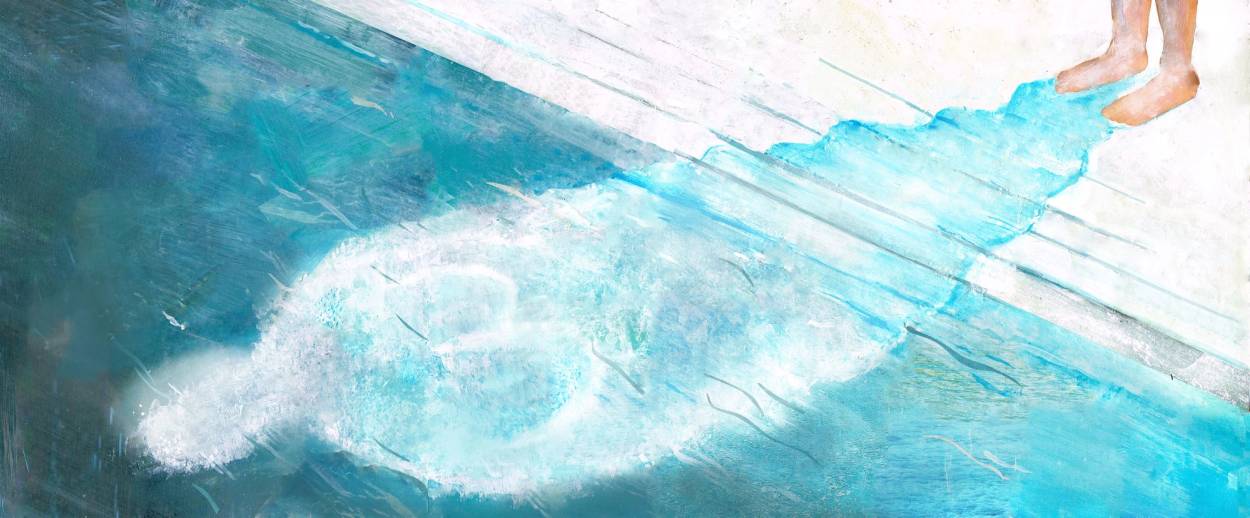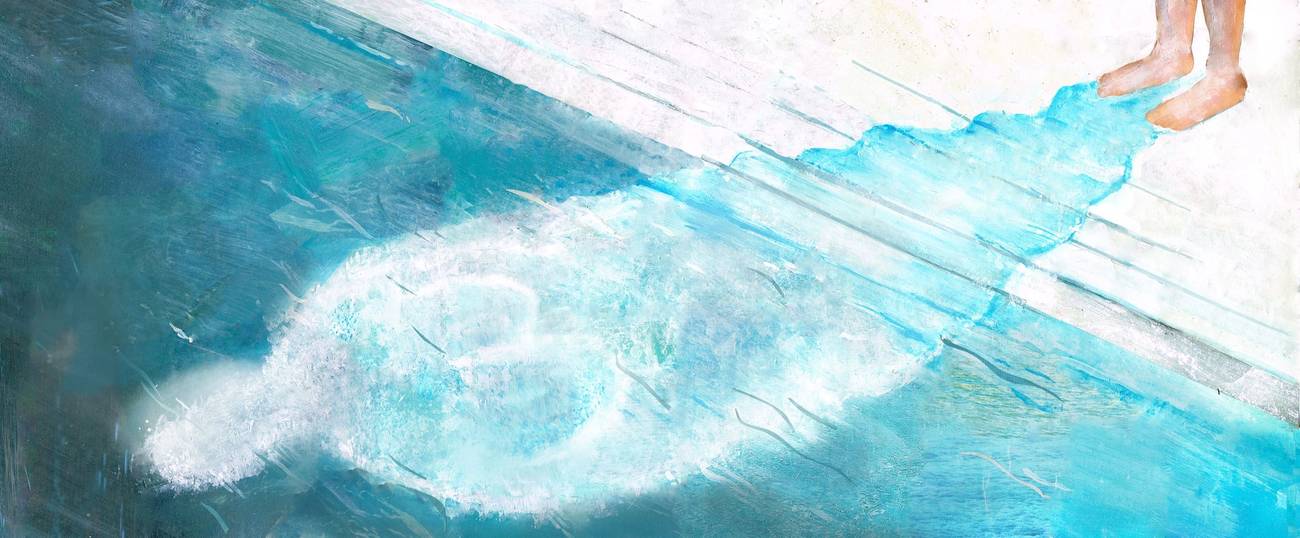Baring Myself in the Mikveh
Converting to Judaism didn’t only change how I felt spiritually. It changed how I felt about my body.




I am naked. Chava, the mikveh lady, has said she’ll listen for me to enter the pool. The room contains a shower, sink, and toilet in an alcove. Think spa. In the shower, where I scrub myself clean according to directions on a laminated card, the soap smells of flowers and mint. Chava says she will enter the room only once I’m submerged. I wonder how she can know that only by listening.
Outside the blue door to the mikveh, in a small waiting room with pamphlets and a guestbook, sit Chava, three rabbis, and my husband. Alone in the mikveh, I descend the seven stairs into the pool. Let me rephrase that: I practically jump into the pool and loudly splash in my haste to submerge my nakedness as soon as possible. I’m unsure that this is the holy experience I’d been expecting as the conclusion of my conversion to Judaism.
The water in the mikveh feels different from the water in my shower. This water is as soft as fleece and warm as human skin; a certain percentage of this water must be from a natural source, such as rain. The door opens and Chava enters. The warm air and water soothe my nerves: Chava’s smile soothes them, too. My nerves need a lot of soothing. I am in a room alone with her, and my husband is sitting outside in the tiny waiting room. At first I’m not sure what to make of a stranger being here while I’m naked, while the person who sees me naked the most is not here. But it feels right this way. Chava’s warmth puts me at ease. My body is a blur in the water. As I start to sing the three prayers, I forget about my nakedness.
The singing helps me to mark this moment. It reminds me of how we mark Shabbat as out of the ordinary and make it what Rabbi Abraham Joshua Heschel called a “sanctuary in time.” The mikveh becomes a sanctuary, and the world outside barely seems to exist. This sanctified time—when I am naked, singing—is when I change from a non-Jew to a Jew. The time in the mikveh waters is for renewal, for welcoming something new to my life. I welcome Judaism—even the fact that there’s still a lot I don’t know yet.
This moment in the mikveh marks a change in me. Not just the time when I become a Jew. But the time when, for the first time, I learn not to care that I am naked. Having to bare myself to become a Jew changes how I feel about my body.
When I was growing up in Bethesda, Maryland, in the 1980s, my parents wandered the house in a state of déshabillé: My father sunbathed nude on the roof, and my mother wore thin cotton house dresses. I found this immensely embarrassing, and, perhaps in reaction against their casual attitude toward modesty, I was always very modest about my own body.
When I was 9, I would change clothes at the swimming pool only in a curtained changing booth while others changed in the open locker room. Once I heard a girl ask her mother why I didn’t change in the open space. The mother said I was probably shy. This mortified me. Strangers had found me out.
By the time I got to college I’d grown partly out of the modesty: I did not feel as awkward. I had a boyfriend. We were amorous. However, I still wore modest clothing most of the time: pants, long skirts, crewnecks. Not shorts, plunging necklines, bikinis.
One warm day I met with a male college professor to discuss a paper, then walked out onto the plaza. A woman I didn’t know ran up to me and pointed. I looked down to find that the weight of my backpack had pulled apart my button-down shirt so that most of my black bra showed. I buttoned up while the woman looked on, aghast. I didn’t even mention to her that I’d just spent a half hour facing a male professor. Had he been looking at my bra? I could not blame him for not saying anything—even more awkward than being seen was the idea of discussing my wardrobe malfunction.
It was years before I risked wearing a button-down shirt again.
Around the same time, I began exploring religion beyond the haphazard Christianity I’d grown up with. (Recently, my mother told me she became Episcopalian because there was a gas shortage and the Episcopal church was within walking distance.) My college boyfriend and other Jewish friends exposed me to Judaism—I’d attended bar mitzvahs and bat mitzvahs, Jewish weddings, and Shabbat services over the years, but I had remained a distant, even clueless participant. Judaism attracted me because of its intellectual interpretations of the Torah, its concern with social justice, and its framework for living a good life. But by the time I wanted to know more, I’d broken up with that Jewish boyfriend, and my other Jewish friends were scattered around the country. For about 10 years, I let the idea sit.
In the meantime, I moved to Florida, where I met my husband, whose appreciation of my bare legs emboldened me to wear shorts in the tropical heat. We earned degrees, returned to Washington, started jobs and a life together. Though for years I’d contemplated becoming Jewish, what finally pushed me was two absorbing years editing a Jewish poetry anthology. My husband was not Jewish, nor even religious, but he said he supported my choice. With him on board, I hunted down a rabbi to take me on as a student.
In my Introduction to Judaism course, I learned about how Judaism views the body. We use our bodies while moving in prayer. On Shabbat, in the Birchot HaShachar, we give thanks for what our bodies can do—walking, opening our eyes, waking up—and for having clothing for our bodies. We rock and bow in prayer and give thanks for what our bodies do. This acknowledgement and appreciation of the body attracted me even more to Judaism, even though I’d struggled with my own body issues since childhood.
One day, during a one-on-one meeting, the rabbi told me about the mikveh—gently. No doubt it is delicate, telling someone they will have to go into the mikveh naked to complete the conversion process. In Becoming a Jew, Rabbi Maurice Lamm writes that conversion candidates place themselves in a “radically different physical environment—in water rather than air.” He continues: “This leaves the person floating … substituting the usual forward moving nature and purposeful stride [with] … a detachment from the former environment.” I wondered why my Jewish friends never had to take their clothes off to become Jewish. I felt faintly jealous.
I’d already begun reading conversion stories, and when I first learned of the mikveh, I worried. One conversion story mentioned three male rabbis being in the mikveh with one of the men witnessing the immersion. For me, that would be a deal-breaker: None of the men from my temple was going see me naked, I knew that. But then I learned that my conversion, through Reform Judaism, was not going to place me naked in a room with men.
And so, on a bright, cold February morning last year, I headed to the mikveh with joy—and nervousness. My husband and I drove from our home in the suburbs to a large temple in northwest Washington. In the lobby, we met with three rabbis and a Jewish friend who had come to lend her support.
I answered the rabbis’ questions in the beit din. And then, as we moved downstairs to the mikveh, I reminded myself of what I was there to do. Jewish law states that, in this ritual immersion, every part of the body must be touched by water. Every part.
The moment had arrived. I had come to understand that, despite the spa-like environment, I wasn’t supposed to be completely at ease. I strove for a meditative quiet, and yet I felt jittery—aware of every moment—of my body, of my choices, of seconds and minutes passing. Maybe, I thought, the nakedness would not be so bad after all. Maybe that discomfort was something I would need to embrace.
That’s when Chava took me inside.
More than a year has passed since I converted. Judaism has become central in my life, and at that center, I feel a new sanctuary in my own body as Jew. It is not always comfortable, but I have come to appreciate and to think through my discomfort in ways I never did before. I could never picture myself playing sports before. In the past year, I’ve taken up gymnastics. The sport requires other people’s hands on me to prevent falling and great possibilities for wardrobe malfunctions, yet I’m not worried about those things as much as I used to be.
This new-found comfort even manifests itself in the way I live among other bodies, other people: At temple now, I don’t worry if I don’t know people. I approach people I’ve never met—before I may have hesitated. I sing prayers aloud—if I don’t know all the words, I don’t worry.
I’ve already bared myself to jump naked in a pool with strangers nearby. What’s left to worry about?
Deborah A. Beverly lives in Maryland and is co-editor of The Bloomsbury Anthology of Contemporary Jewish American Poetry.